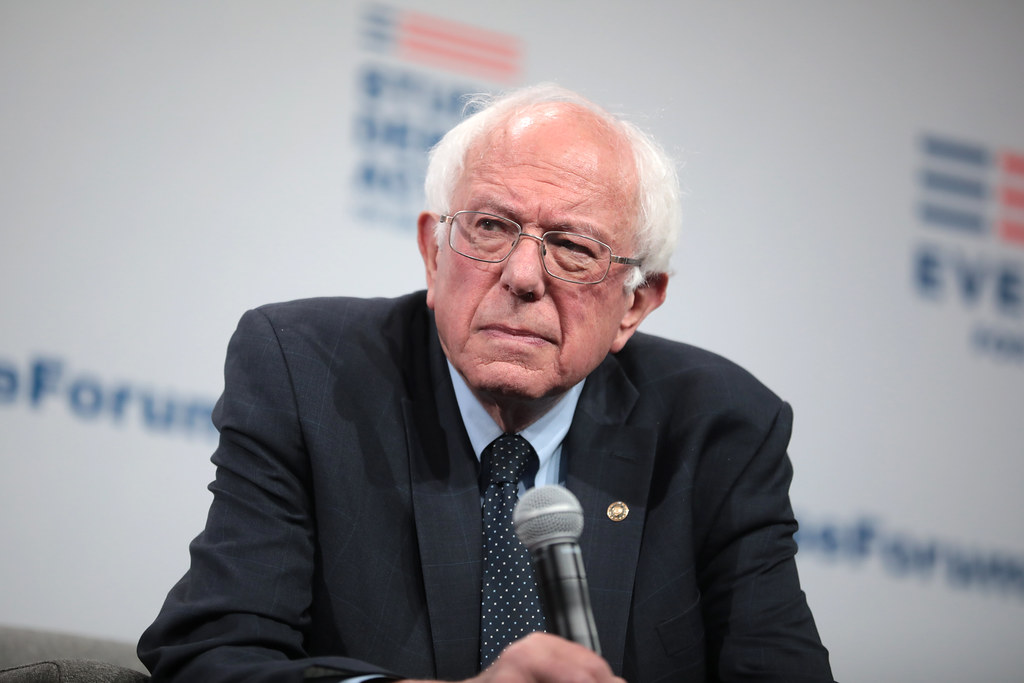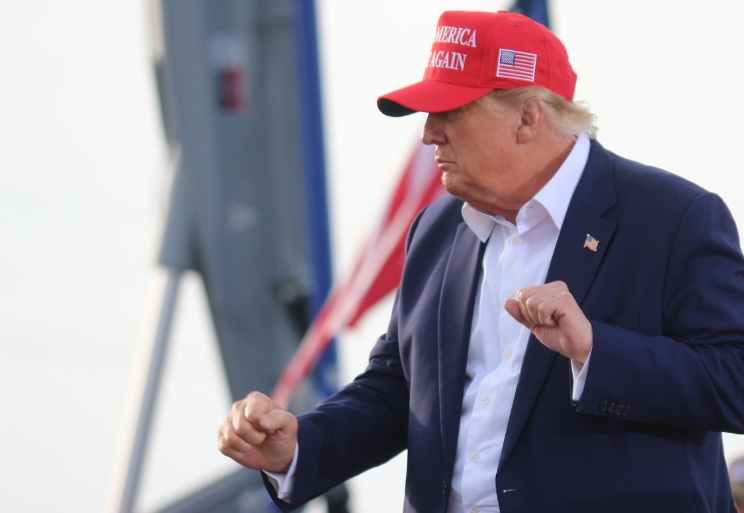The day after the 2024 election, Vermont Independent Sen. Bernie Sanders put out a scathing rebuke of the Democratic Party, saying, among other things, that it had “abandoned working class people,” to which the Democratic National Committee’s chair, Jaime Harrison, swiftly responded, “This is straight up BS.” It was hardly surprising to see the party’s leader respond in such a swift and dismissive fashion; despite a devastating loss, the Democratic leadership continues to defend itself amid an evidently shattered coalition. Make no mistake; it was not Democratic candidate Kamala Harris, much less voters, who lost this election for the Democrats. It was the staggering hubris of the party’s elite and their disdainful treatment of the electorate. Harrison’s response to Sanders was emblematic of the very reason why former President Donald Trump is going back to the White House.
Eight years ago, a key pillar of Trump’s campaign was the concept of “draining the swamp.” As Trump pulled together his populist, reactionary base amid a flood of polls betting against a Republican victory, the DNC, on a Barack Obama-fueled high, was blind to the changing attitude of the nation. While Trump preached a message of drastic change and overhaul of a broken system, Democratic leadership turned to the embodiment of this system of legalized corruption and career politicking: a Clinton.
And this wasn’t because there were no other good options. Sanders knows better than most just how disinterested leading Democrats are with, ironically, the democratic process. As he grew momentum in the Democratic primaries, the elites at the DNC, including Hillary Clinton herself, knew there was only one real nominee, and it wasn’t Sanders. Mid-way through 2015, Clinton and the DNC had signed a deal that “specified that in exchange for raising money and investing in the DNC, Hillary would control the party’s finances, strategy, and all the money raised,” according to former interim chair of the DNC, Donna Brazile. At a time when tens of millions were latching on to Trump’s reactionary populism, the DNC was being held captive by Democrat mainstays. Sanders’ progressive populism was forced to concede the nomination to Clinton.
In 2020, with the benefit of hindsight, the Democrat elites chose to repeat their failed strategy from 2016. Yet again, Sanders seemed to be a serious contender for the party’s nomination, and yet again, the DNC hijacked his ability to contend with their chosen candidate, Joe Biden. Party leadership unified against Sanders to ensure he couldn’t get the nomination, and it almost cost them the election. The predicted ‘blue wave’ in response to Trump’s tenure never came to fruition. In fact, had it not been for the pandemic and the protests following the death of George Floyd, 2020 may well have been Trump’s year, and it nearly was. Trump was polling higher than at any other point during his presidency at the start of 2020, according to Gallup. FiveThirtyEight had him at about a 46% approval rating in March 2020, higher than at any other point in his presidency (although his disapproval rating was also much higher than it had been at the start of his term in 2017). Additionally, in what should have been an ominous foreshadowing of the crushing gains Trump made this year, exit polling from 2020 showed Trump’s support increased with Black and Latino men even as he lost reelection.
Biden’s presidency promised little better due to a mix of factors, many of which he had no control over and which reflect deeper issues with the country’s governmental structure. From a policy standpoint, his administration made some big wins and performed well in a hostile arena, but politically his presidency was a disaster. Most Americans did not feel the impacts of the Inflation Reduction Act, the Infrastructure Investment and Jobs Act, nor the CHIPS and Science Act. Anything more ambitious was virtually impossible because of tight or non-existent leads in the House and Senate throughout his whole presidency. Furthermore, Biden was plagued by the beleaguered post-pandemic economy throughout his time in office, which he had the misfortune of inheriting.
Regardless, it once again was during the campaign trail that Democrats crashed and burned, having ignored all the warning lights. The pinnacle of the party’s arrogant ignorance manifested itself at the Democratic National Convention in August. From the start, the party was not only exemplifying but actively feeding its insulated delusion. Forgoing a competitive primary after Biden dropped out, the party leadership decided for voters who would represent them, an especially salient fact in light of the nationwide Uncommitted Movement. At a time when Americans were continuing to reel from inflation and the Biden administration was actively aiding Israel’s highly unpopular war on Gaza, the Democrats treated the convention like a party. It was a chance for Harris to distinguish herself from Biden and chart a new course for the party, but instead it was a curated cast of characters to affirm the party’s predictable message. One of the most consequential events to come out of the convention was Harris’ rejection of any Palestinian-American speaker, a slap in the face to the hundreds of thousands who cast uncommitted votes during the Democratic primaries, progressive factions of the party, and Arab-Americans across the country.
Despite widespread warnings, the party’s establishment contented itself to make all the same mistakes that it had in the past two election cycles. In the face of a longing from the American people for change, evidenced by Biden’s abysmal approval ratings and record levels of distrust in government, the party chose the same tactic as they had before. Like some sort of sickening deja vu, Democratic elites decided to cast Trump as a dangerous threat to the status quo, try to gaslight people into believing that they want to keep the status quo, and then, yet again, act surprised when voters give a resounding rejection of that vision, or lack thereof.
Trump is capitalizing on the country’s dissatisfaction with a government that does not listen to them with his brand of bigoted, reactionary populism. While Trump’s success is based upon a variety of issues, such as deep-seated racism within the country and nationwide nostalgia for some bygone era, he first and foremost continues to beat Democrats with his fundamentally changed vision for the United States. Certainly, it’s hard to believe that so many Americans are either unbothered by or relish Trump’s racism and misogyny, but when there is no alternative vision for the country, voters are much more susceptible to appeals to their worst impulses and fears. Democrats need to stop treating Trump and his base as what’s wrong with the country and start confronting the problems which got him elected the first time.
Nobody at the top of the Democratic ticket currently is willing to chart a unique path from the Republicans. On immigration, instead of defending the value of the U.S.’s diversity, arguing for a more efficient path to citizenship, and rebutting the false claims that immigrants are criminals taking American jobs, the Biden administration tried to match the Republicans’ hardline approach to immigration both in policy and rhetoric. Despite the economy polling as one of the most important issues for voters, both the Biden and Harris campaigns chose to focus very little attention on it and instead let Trump and his allies shape the narrative, a huge and unnecessary concession. From slashing or zeroing the cost of public universities to increasing social welfare programs and implementing a single-payer healthcare system, there are so many areas in which the Democrats could argue for progressive new solutions. Furthermore, it’s not difficult to point toward the Republicans’ prioritization of the rich and powerful at the expense of all others.
The list of changes that Democrats need to make is long, but at a very basic level, if they want to beat Trump’s populism, they need to embrace their own form of populism, complete with a vessel of blame. Flip the script on corrupt, self-interested career politicians like Rep. Nancy Pelosi and Sen. Mitch McConnell and billionaires like Elon Musk and ExxonMobil CEO Darren Woods, who have an absurd amount of influence over elected officials; channel Americans’ fury at those who made the country so beholden to the rich and powerful.
There is reason for Democrat voters to be optimistic about Trump’s win, as counterintuitive as it may seem. There is an opportunity to overthrow the old guard and create a party that isn’t a vessel for billionaires and special interest groups but a progressive, ambitious people’s party. Jill Stein, Cornel West, and Claudia de la Cruz are proof that this will not be possible from outside the establishment, but Trump proves that a unique ideology and cult of personality can overhaul the American political scene from within. But so long as preservationists like Jaime Harrison control the party and readily dismiss any criticism to their authoritative stranglehold of its politics, the country’s descent into fascism is guaranteed, and the blame will be with the arrogant elites, not desperate voters.
















Vinh T. • Dec 15, 2024 at 8:11 am
In my opinion, the Democrats fail to present otherwise sensible ideas, as nothing more than the same bland strategies for the U.S. Along with the heavy association with the elite this year, Liberals fail to address working class and middle class voter’s concerns and instead, dismiss them as harmful to American society. Effectively, this proves the GOP right about complaints they have against the Donkeys. The Red Tsunami will only get stronger if Dems remain to denounce Populism, avoid new issues that the average voter will bring to the ballot, focus only on the ideas of a specific voter group, and continue to associate themselves with the “establishment.”
Bryce Baker • Dec 16, 2024 at 11:41 pm
In your opinion, what “otherwise sensible ideas” would you like to see the Democrats support?
C.J. Hoehn • Nov 19, 2024 at 8:24 am
Even as I come from demographics that have historically been the greatest bases of the democratic party, I feel increasingly alienated every election cycle. Wonderful article Darin.
I wonder if you think the Israel/Palestine and Ukraine conflicts factored into American’s choice of Trump.
Carole Eberhardt • Nov 29, 2024 at 11:39 am
Too many American DO NOT THINK but can be made o feel.